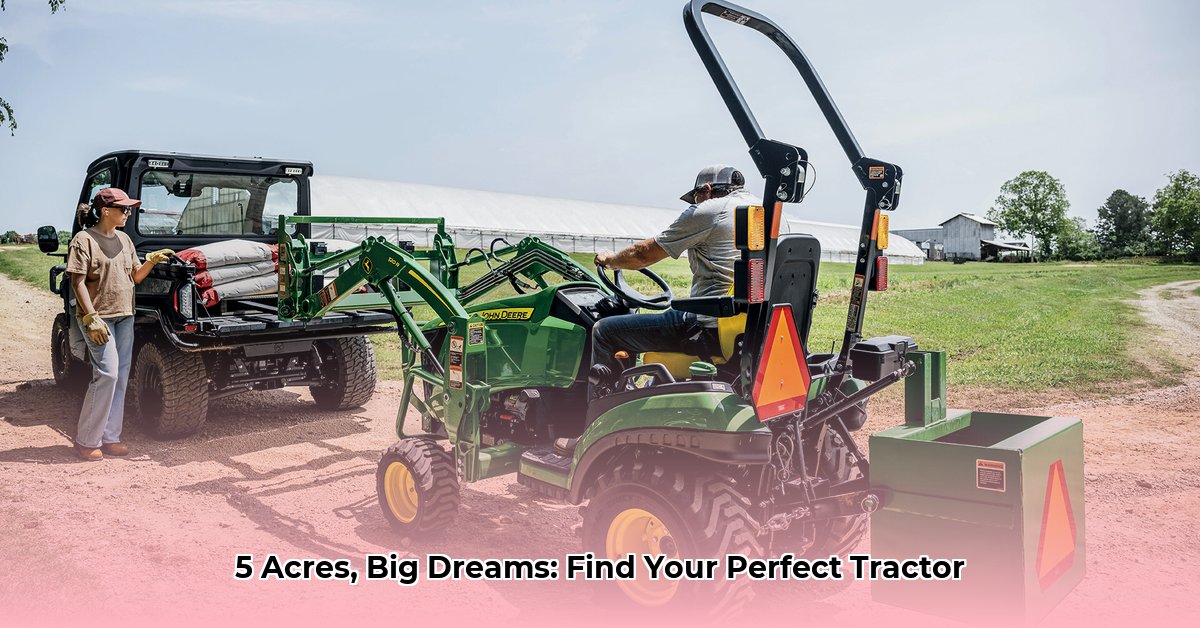
Choosing the right tractor for your 5-acre farm is a significant investment, impacting both your productivity and environmental footprint. This guide provides a step-by-step approach to selecting the ideal tractor for your sustainable farming operation. For more information on tractor pricing, check out this helpful resource: Mahindra Tractor Prices.
Understanding Your Needs: More Than Just Horsepower
Horsepower is a key factor, but it's not the only one. For 5-acre farms, tractors in the 25-40 horsepower (HP) range often strike the best balance between capability and fuel efficiency. However, the specific horsepower you need depends greatly on your unique situation. Do you have hilly terrain? Will you be hauling heavy loads? These factors can significantly impact your horsepower requirements. Consider a higher horsepower model (40-50 HP or more) if your needs are more demanding.
Sub-Compact vs. Compact Utility Tractors (CUTs): A Comparative Look
Two primary tractor types cater to small farms: sub-compact and compact utility tractors. Let's explore their pros and cons:
Sub-Compact Tractors:
- Pros: Affordable, maneuverable, fuel-efficient. Ideal for smaller, flatter properties with lighter tasks.
- Cons: Limited power, fewer implement options, may struggle with heavier tasks.
Compact Utility Tractors (CUTs):
- Pros: More powerful, versatile, handles heavier loads and demanding tasks with ease.
- Cons: Higher initial cost, larger footprint, potentially overkill for some tasks.
Which type is right for you? It depends on your specific tasks and terrain. If your work involves frequent heavy lifting or tilling tough soil, a CUT is likely the better choice. For simpler tasks and smaller spaces, a sub-compact could be sufficient and more cost-effective. A rhetorical question to consider: Is your primary focus cost-effectiveness, or maximizing versatility and power for a wider range of tasks?
Matching Your Tractor to Your Farming Style: A Personalized Approach
Your farming style significantly shapes your tractor needs. Are you primarily focused on:
- Orchard management? Maneuverability is paramount; a sub-compact might be appropriate.
- Row crop cultivation? A CUT, with its greater power, might be more suitable.
- Pasture maintenance? A combination of mowing and hauling capabilities are important.
Consider your seasonal tasks, and choose a tractor with compatible implements to support those operations. A quantifiable fact: Selecting appropriate implements can improve efficiency by up to 20%, according to research in agricultural engineering.
Sustainable Farming Considerations: Minimizing Your Footprint
Sustainable farming necessitates reducing environmental impact. Consider these factors:
- Fuel Efficiency: Diesel tractors generally offer better fuel economy than gasoline models over their lifespan, contributing to cost savings and a reduced carbon footprint.
- Durability & Longevity: A durable tractor minimizes waste through extended service life.
- Easy Maintenance: Reduced maintenance needs translate to lower operational costs.
- Precision Agriculture: Compatibility with GPS guidance systems optimizes fuel and input usage.
"When choosing a tractor for sustainable farming, focus on efficiency and longevity," states Dr. Emily Carter, Professor of Agricultural Engineering at the University of California, Davis. "These factors minimize both your environmental impact and long-term expenses."
Choosing Your Tractor: A Step-by-Step Guide
- Assess your needs: Detail your farming tasks and required implements.
- Set your budget: Consider upfront costs and ongoing maintenance expenses.
- Research models: Explore options from reputable brands like John Deere and Kubota.
- Compare specifications: Analyze horsepower, fuel efficiency, implement compatibility, and warranty.
- Demo and test drive: Experience handling and comfort before committing.
- Consider the dealer: Select a dealer with strong customer service and support.
Budget and Financing: Planning for the Long Term
Remember, the initial purchase is only part of the equation. Factor in ongoing maintenance costs, potential upgrades, and the expense of additional implements. Used tractors can offer significant cost savings, but careful inspection is crucial. Financing options (loans, leases) can help spread the cost over time. A key question to ask yourself: Can I afford not just the initial purchase, but the ongoing maintenance and fuel costs associated with tractor ownership?
Conclusion: Finding Your Perfect Tractor Match
Selecting the best tractor for your 5-acre farm requires careful planning, but this guide equips you to make an informed choice. Remember, the ideal tractor is the one that best aligns with your specific needs, farming style, and sustainability goals.